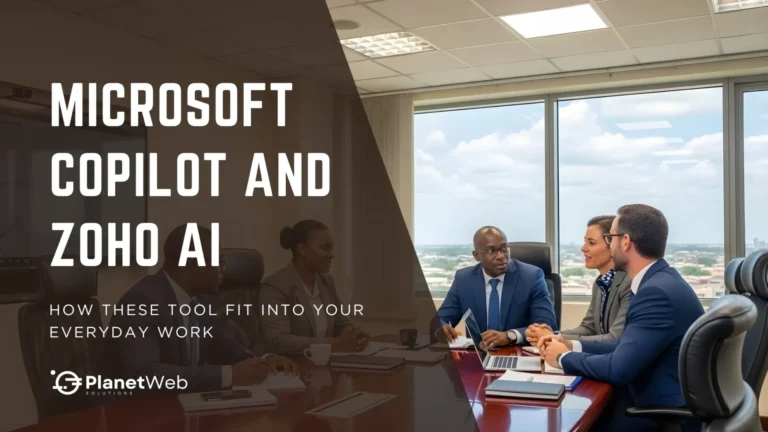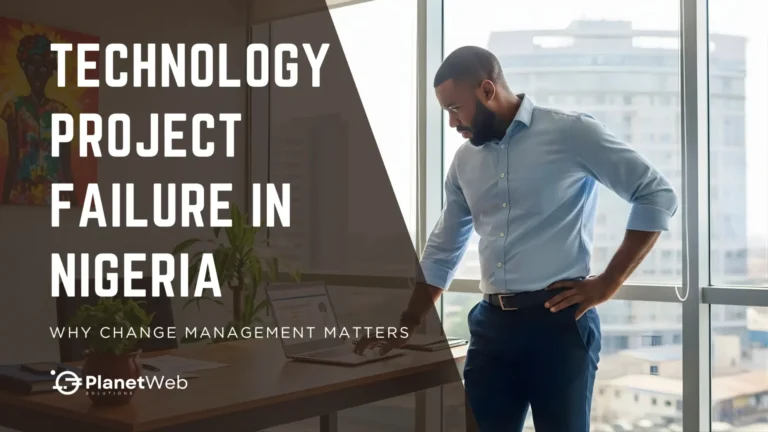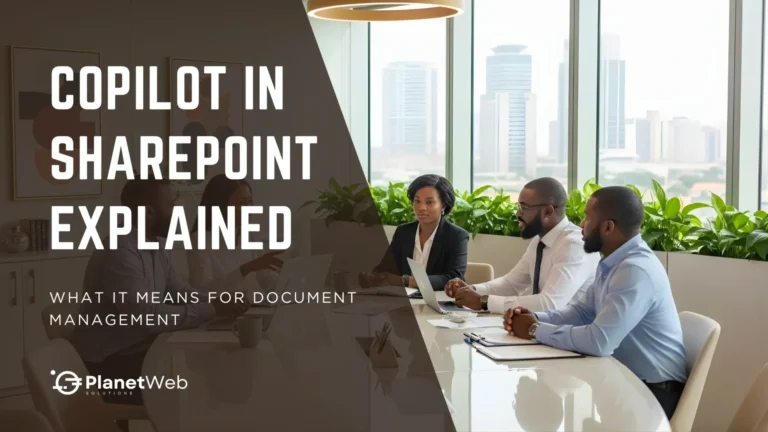When to Hire IT Support in Nigeria: An Honest Guide for SMEs
A Lagos-based retailer lost ₦12 million in two days. Not from theft or fraud, but because ransomware locked them out of their own sales system during peak season.
The owner told me later: “We thought we were too small to be a target. We were wrong.”
This happens more than you’d think. According to the Nigerian Communications Commission (NCC), cybercrime costs Nigerian businesses over ₦127 billion every year. Yet most SMEs still treat IT as something to “figure out later” or handle with a nephew who’s “good with computers.”
So, when should you actually hire professional IT support in Nigeria? The honest answer isn’t “when you can afford it.” It’s “before something expensive breaks.”
Here’s how to know if that moment is now.
🚨 Top Signs You Need IT Support
You should seriously consider professional IT support if you’re experiencing:
- Revenue loss from system downtime (even once or twice a year)
- Uncertainty about NDPA compliance and data protection
- Growing cybersecurity concerns or past security incidents
- Unpredictable IT costs that keep exceeding budget
- No qualified staff to handle security, compliance, or infrastructure
- Slow response times when critical systems fail (2+ hours)
- Technology limitations preventing business growth or digital expansion
The Real Cost of Waiting
Most business owners think about IT support the way they think about insurance – nice to have, but not urgent. Then something breaks.
PwC’s 2022 SME Tech Survey found that 70% of Nigerian SMEs suffered significant revenue loss from IT downtime that year. Not minor inconveniences. Actual revenue loss.
The thing is, downtime doesn’t announce itself politely. It shows up during:
- Your biggest sales period
- Right before payroll
- The day of a major client presentation
- When you’re trying to process end-of-month reconciliations
A Lagos e-commerce startup lost 40% of their Black Friday sales because their server crashed. They’d been meaning to upgrade their hosting, but kept pushing it back. That delay cost them more than three years of proper IT support would have.
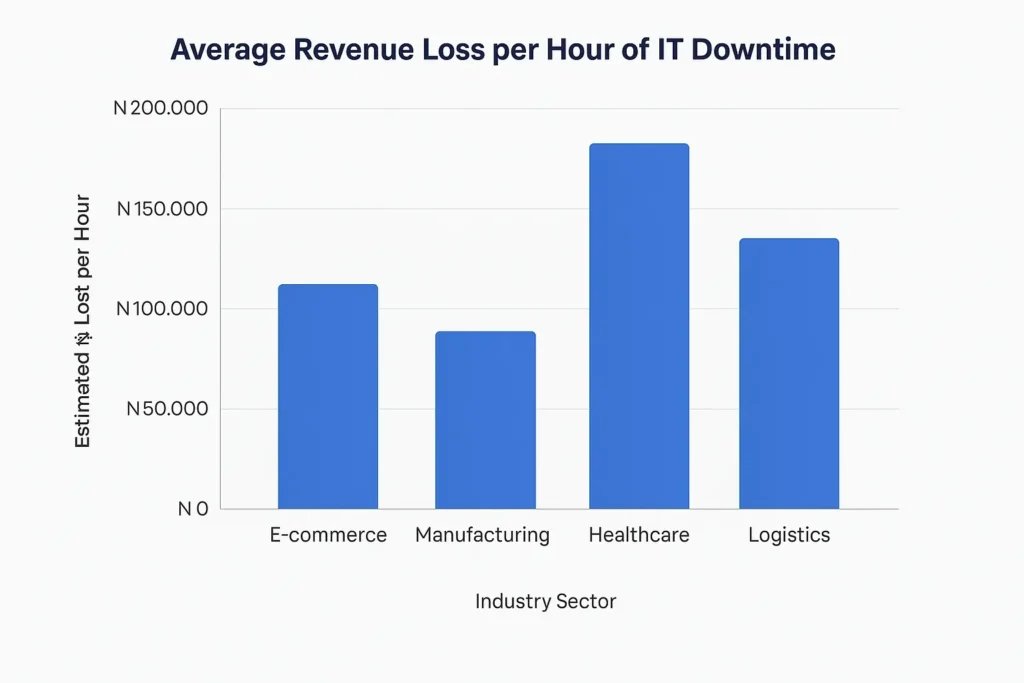
If you’re losing money to downtime—even once or twice a year—you’ve already crossed the line where IT support pays for itself.
When Compliance Becomes Non-Negotiable
Let’s talk about something that makes most business owners nervous: the Nigeria Data Protection Act (NDPA).
The penalties aren’t small. Non-compliance can cost you up to ₦10 million or 2% of annual gross revenue, whichever is higher. Unlike many regulations in Nigeria, the NDPC (the enforcement body) is actively investigating complaints and issuing penalties.
Here’s what most people don’t realize: NDPA compliance isn’t just about having a privacy policy on your website. It’s about how you:
- Store customer data
- Handle employee information
- Manage access controls
- Respond to data breaches
- Document your security measures
If you’re in financial services, e-commerce, healthcare, education, or logistics, you’re handling sensitive data every single day. One breach, one complaint, one audit – and suddenly you’re explaining to regulators why customer data was stored on an unsecured laptop.
A fintech company in Lagos got ahead of this by working with a Managed Service Provider (MSP) to encrypt all customer financial data and document their compliance procedures. Many MSPs also provide Data Protection Officer (DPO) support, helping businesses meet NDPA requirements for designated privacy oversight. When NDPA auditors came knocking, they sailed through. No penalties, no downtime, no panic.
The question isn’t whether you need to comply. It’s whether you want to figure it out under pressure or get it right from the start.
Learn more about Data Protection Compliance in Nigeria.
The Security Wake-Up Call
Nigeria reported over 3,500 cyber incidents in 2022, according to NITDA. That’s just what got reported. The real number is almost certainly higher.
Small businesses make attractive targets because hackers know you probably don’t have:
- Multi-factor authentication
- Regular security patches
- Employee training on phishing
- Backup systems that actually work
- A response plan when (not if) something happens
Building a comprehensive cybersecurity framework doesn’t have to break the bank, but it does require expertise and consistent attention.
Nigerian businesses lose weeks of work because their backups were corrupted. Ransomware spreads through offices because one person clicked a link in a “payment confirmation” email that looked completely legitimate.
The attacks are getting smarter. Phishing emails now use perfect English, reference real transactions, and come from addresses that look almost identical to legitimate ones. Your team won’t spot them without training.
A fintech company using MSP-managed protections blocked over 1,000 phishing attempts in six months. Not because their staff were careless, but because the attempts were that frequent and that convincing.
When to hire IT support in Nigeria for security? Before you’re explaining to clients why their data was compromised.
The Budget Reality Check
Let’s be real about money. Hiring IT support feels expensive until you compare it to the alternative.
Break-fix IT – where you call someone when something breaks – seems cheaper on paper. You only pay when you need help, right? Except:
- Emergency rates are 2-3x normal rates
- You have no idea what next month will cost
- Downtime while you wait for help costs you money
- Every “quick fix” adds up
- You’re always reacting, never preventing
Here’s what the actual numbers look like for most Nigerian SMEs:
| Cost Area | In-House IT | Managed IT Services |
|---|---|---|
| Staffing | ₦3M+/year per person | Included in flat monthly fee |
| Hardware/Software | Separate, unpredictable | Often bundled |
| Downtime Recovery | Expensive and reactive | Proactive, included |
| Generator/Energy | High (running servers) | Reduced via cloud |
Most MSP plans for SMEs start around ₦500,000/month. That might sound like a lot until you factor in what you’re getting:
- A full team of specialists (not just one overworked IT guy)
- 24/7 monitoring
- Regular maintenance and updates
- Security management
- Compliance support
- Predictable costs
And here’s something most people miss: MSPs help you reduce other costs. By moving to cloud solutions, you cut down on generator fuel for servers. Remote tools mean less travel. Automated backups mean you’re not paying someone to manually copy files every night. Many businesses find that workflow automation alone recovers a significant portion of their MSP investment.
The question isn’t whether you can afford IT support. It’s whether you can afford not to have it.
When Your Team Can’t Keep Up
Hiring IT talent in Lagos or Abuja is tough. Good people cost real money, and they get poached constantly. Even if you manage to hire someone, you get:
- One person with one skill set
- No coverage when they’re sick or on leave
- Limited expertise in specialized areas
- No backup if they quit
Modern businesses need expertise in:
- Cloud architecture and migration
- Cybersecurity and threat monitoring
- Regulatory compliance
- Network management
- Data backup and recovery
- Help desk support
No single person is great at all of that. And you can’t afford to hire six specialists.
A Managed Service Provider gives you access to an entire team – cloud engineers, security analysts, compliance officers, support technicians – for less than you’d pay one senior IT person. They’re Microsoft-certified, ISO-aligned, and handle businesses like yours every day.
If you’re making do with someone who’s “pretty good with tech” but not actually trained in IT security or compliance, you’re hoping nothing important breaks. That’s not a strategy. Consider strategic IT outsourcing as a way to access world-class expertise without the overhead of building an entire department.
Explore Managed IT Services in Nigeria to see how this works.
When Speed Actually Matters
Picture this: It’s Monday morning. Your system crashes. You call your IT person. They’re handling another client. They’ll get to you “as soon as possible.”
By Wednesday, you’re still waiting. Your team is idle. Customers are calling. You’ve lost track of how much money you’re bleeding.
This happened to a logistics company in Kano. A major system failure on Friday meant they couldn’t dispatch vehicles. By the time support showed up Monday afternoon – 48 hours later – they’d lost over ₦800,000 in missed deliveries and had drivers sitting around with nothing to do.
Professional IT support comes with Service Level Agreements (SLAs). That means guaranteed response times – usually within an hour for critical issues. Not “when we get around to it.” Actual contractual commitments.
MSPs monitor your systems 24/7. Many issues get caught and fixed before you even notice them. When something does go wrong, they’re already looking at diagnostics and remotely troubleshooting while you’re still reaching for the phone.
Fast support isn’t a luxury when every hour of downtime costs you real money. It’s survival.
Growth Means Going Digital
COVID changed something fundamental. Remote work, cloud platforms, mobile apps – these aren’t “nice to have” anymore. Your competitors are using them. Your customers expect them. And Nigeria’s digital economy is creating new opportunities for businesses that can keep up.
But here’s what holds most Nigerian businesses back: their IT can’t handle it.
You can’t offer remote work if your team can’t access files securely from home. You can’t expand to a new branch if your systems only work in one location. You can’t go online if your current setup crashes under higher traffic.
Legacy IT setups – the ones cobbled together over the years with whatever worked at the time – struggle with:
- Remote access for field teams
- Real-time inventory tracking across multiple locations
- Secure customer portals
- Mobile apps for sales teams
- Reliable uptime during traffic spikes
MSPs build for scalability. Cloud-based systems that work whether you have 5 employees or 50. Tools like Microsoft 365 let your team collaborate from anywhere. Virtual desktops that stay secure even when people work from home. Automated systems that keep running even when PHCN doesn’t.
When to hire IT support in Nigeria if you’re planning to grow? Before growth gets limited by your technology.
A Practical Framework for Making the Decision
Here’s a simple way to think about whether it’s time:
You definitely need IT support if:
- You’ve lost money to downtime in the past year
- You handle customer data and aren’t certain you’re NDPA compliant
- You’ve had a security scare or near-miss
- Your IT costs are unpredictable and often exceed budget
- You don’t have anyone qualified to handle cybersecurity
- Critical issues take more than 2 hours to get attention
- You want to scale, but your IT can’t support it
You might need IT support soon if:
- You’re handling more sensitive data than you used to
- Your team is growing, and IT tasks are taking up more time
- You’re considering remote work or digital expansion
- You’re spending more time worrying about IT than running your business
You probably don’t need it yet if:
- You’re a solo entrepreneur with minimal IT needs
- You have a qualified IT professional on staff who isn’t overwhelmed
- Your systems are modern, secure, and rarely have issues
- You’re confident in your security and compliance
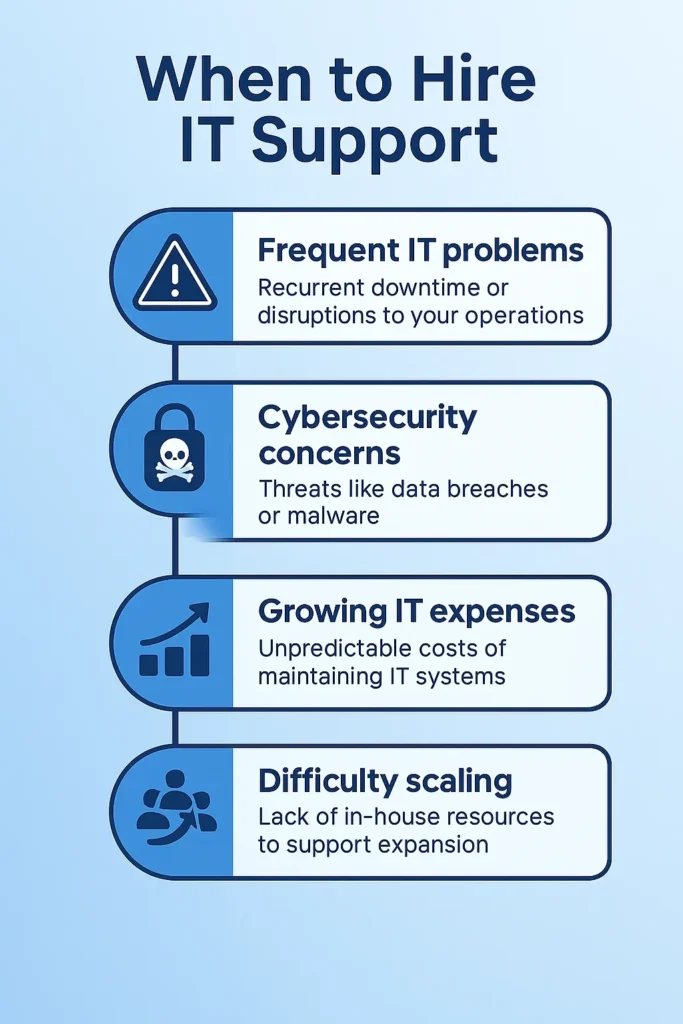
The Bottom Line
Most Nigerian business owners wait too long to get serious about IT support. They wait until:
- Something expensive breaks
- A regulator comes asking questions
- A breach exposes customer data
- A major opportunity gets missed because the tech couldn’t handle it
By then, you’re making decisions under pressure with limited options.
The smarter move? Get IT support before you desperately need it. When you have time to find the right provider, implement things properly, and prevent problems instead of constantly reacting to them.
If any of the situations in this article sound familiar, that’s your signal. Don’t wait for the ₦12 million moment.
Stay Ahead with Expert IT Insights
Making smart IT decisions requires staying informed about technology trends, security threats, and best practices for Nigerian businesses. We publish in-depth guides, case studies, and practical advice to help business owners navigate the complex world of IT support and digital transformation.
Subscribe to our newsletter to get expert IT insights delivered directly to your inbox. You’ll receive:
- Practical guides on IT management for Nigerian businesses
- Updates on NDPA compliance and cybersecurity threats
- Case studies showing real results from local companies
- Early access to new resources and exclusive content
Join hundreds of Nigerian business owners who rely on our insights to make better technology decisions.
Ready to get ahead of IT problems instead of chasing them? Schedule a Free IT Audit with PlanetWeb Solutions. We’ll review your current setup, identify vulnerabilities, and show you exactly what proper IT support would look like for your business.
PlanetWeb Solutions has worked with Nigerian businesses since 2015, handling everything from cybersecurity to NDPA compliance to daily IT support. We understand the power challenges, the infrastructure limitations, and the unique pressures of running a business in Nigeria. Let’s make sure your technology helps you grow instead of holding you back.


